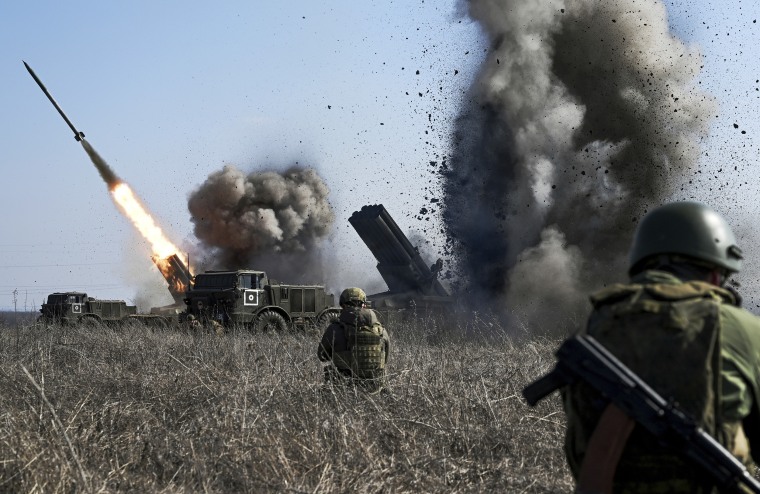What to know as Putin to win after Navalny death, war in Ukraine
There is no one to oppose Putin on the ballot anyway. Russia’s opposition has been decimated, with Navalny’s death last month just the latest devastating blow.
“The political field has been cleared out,” Yekaterina Duntsova, a former regional legislator and journalist who tried running for president this year, told NBC News.
“Fundamentally, the country has changed for the worse in the last six years,” said Duntsova, in a phone interview from Moscow earlier this month. She was one of two candidates with an anti-war message barred from running against Putin, while three Kremlin-approved candidates will be on the ballot alongside the Russian leader.
“People live in a state of aggression — finding out who is for and who is against, looking for some virtual enemies and the fifth column,” she said.
Russian elites with anti-war views have been forced into exile, and those remaining in Russia have been kept in check. Independent media fled the country, and any form of protest has become impossible without risking arrest.
History textbooks have been altered to extol the virtues of the war, basic military training is now part of the curriculum for high school seniors, and public spaces are filled with posters summoning Russian men to join the army. The so-called “Western values” of freedom of expression and respect for human rights have been banished, resulting in the outlawing of the LGTBQ+ “movement” and persecution of human rights advocates.
Politically motivated arrests and the detention of foreigners, including Americans, are also becoming routine.
“Russian society is at a point right now where it’s experiencing the largest scale of political repressions — particularly for expressing one’s opinion or exercising one’s rights and freedoms,” said Denis Shedov, a board member for the Memorial Human Rights Defense Center, heir to the human rights group Memorial, which was shut down in Russia in late 2021. “We have not seen the likes of this in the history of modern Russia.”
What changed over the last six years is that many Russians now live with a “palpable fear and anxiety” about repression, Shedov said, unclear about what actions or mere words could land them in trouble.
That has spiraled out of control since the war started, he said. His organization has documented the cases of 682 political prisoners, but that number is likely much greater, Shedov said, as limited resources mean his colleagues sometimes “can’t keep up with reality.”
Diplomacy and dissent
Putin’s standing has been evident on the global stage in recent weeks, too.
He has renewed his nuclear saber-rattling and repeatedly inserted himself into the U.S. election campaign, exploiting splits in the Western alliance that may be amplified by the return of former president Donald Trump.
Putin has stated his preference for President Joe Biden to remain in the White House, a mischievous intervention that may hint at his confidence in the geopolitical winds.
The Kremlin’s military has been advancing on the battlefield in Ukraine, taking advantage of stalled U.S. aid and Kyiv’s dire shortages of soldiers.

But he has not had it all his own way.
Less than a year ago, the Russian leader faced the gravest challenge to his rule, in the shape of Wagner mercenary chief Yevgeny Prigozhin. And while he saw off that short-lived mutiny, it was a sign of the unpredictable forces the war in Ukraine has unleashed.
For all his army’s recent progress, Putin has fallen far short of his hopes for a rapid campaign that would force Ukraine’s capitulation. Instead two years in, Russian border towns and villages are frequently targeted by Ukrainian shelling and even incursions by anti-Kremlin fighters. Deeper into Russia, the country’s energy infrastructure has faced the dual threat of a growing wave of Ukrainian drone attacks and its own Soviet-era frailties, which caused a utilities collapse this winter.
And while Putin has tried to keep the war a distant concept for the public, the attritional fight has fueled anger from an unexpected source.
The wives of men mobilized to fight in Ukraine have publicly called him out for failing to return their men home and end the war, wielding white scarves and flowers in protest. They have now called on Russians to spoil their ballots because they say no candidate has answered their pleas.
This simmering sentiment led two people with an anti-war message to emerge during the election cycle. Duntsova was rapidly barred, but seasoned politician Boris Nadezhdin drew people from across Russia to line up and give their signatures in support of his anti-war…
Read More: What to know as Putin to win after Navalny death, war in Ukraine

